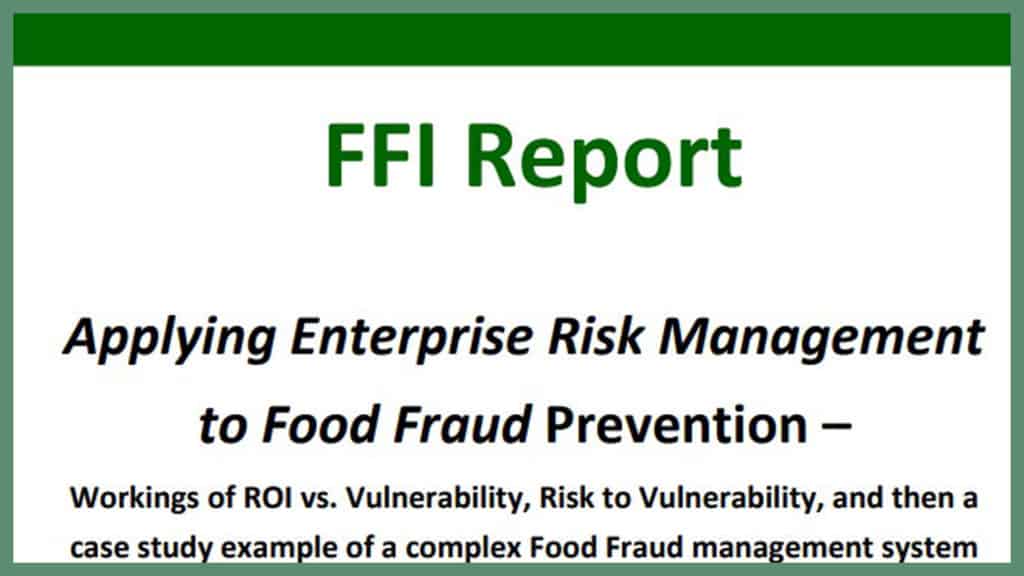This is a follow-up to our March 2017 Food Fraud Insight Report (FFIR) on “The Role of Enterprise Risk Management (ERM) in Food Fraud Prevention.” Our new report expands to the applications built around a case study of a complex Food Fraud management system. Key concepts addressed are risk versus vulnerability, as well as shifting from a focus on ROI to managing unacceptable risk.
Link to report: https://blog.foodfraudpreventionthinktank.com/wp-content/uploads/2021/02/BKGFF17-FFI-Backgrounder-2016-ERM-ERM2-v46-2.pdf
Abstract/Executive Summary:
Background: Food Fraud is illegal deception for economic gain using food. Over the last 10 years a series of incidents has raised awareness and urgency in addressing Food Fraud, including the focus on a proactive prevention approach. This holistic and all-encompassing approach includes specialized methods to assess past incidents in the marketplace, review the fraud opportunity, conduct assessments, connect to enterprise-wide decision-making systems such as Enterprise Risk Management, and refine internal control systems. Methods: This report builds upon previous Food Fraud prevention and Food Fraud Enterprise Risk Management research to provide a case study example of a complex Food Fraud management system. The case study was of the Kerry Group’s specific Global Supply Quality Risk and Vulnerability Management and Governance system. Results: The report and case study demonstrate how a holistic and all-encompassing approach to Food Fraud prevention created control systems and risk communication for an enterprise. Conclusion: The entire Food Fraud Prevention Cycle provides a foundation for a rational and integrated approach that “connects everything to everything.”
Video Presentation of this Report at: https://youtu.be/DVl_k-7_NEw
Our research group is proud to announce a generous gift from Kerry’s Global Supply Quality team to support a Food Fraud Insight Report on “Applying Enterprise Risk Management to Food Fraud Prevention – Workings of ROI vs. Vulnerability, Risk to Vulnerability, and then a case study example of a complex Food Fraud management system.” This report was published in August 2017 and will be presented by Dr. Spink at the Food Safety Summit May 2018, Chicago.
Dr. Spink stated, “Gifts like this enable us to pursue the most important Food Fraud prevention research questions, regardless of the current public government funding or the opportunity to publish in the academic journals.” As for public funding, most countries haven’t even formally defined Food Fraud yet, let alone defined the research needs in strategy and policy. Food Fraud is becoming a more common academic journal publication topic and we are just now starting to see increased awareness of the needs in more applied and interdisciplinary research.
The definition in the 2011 Journal of Food Science article Defining the Public Health Threat of Food Fraud has been widely quoted, including by the Elliott Review (United Kingdom), the European Commission resolution addressing Food Fraud, early Global Food Safety Initiative (GFSI) Food Fraud Think Tank presentations, and the Congressional Research Service report on Food Fraud (USA).
This report focused on the application of Enterprise Risk Management (ERM) – a function of the Council of the Sponsoring Organization of the Treadway Commission (COSO, itself a group of the five leading financial or managerial accounting associations) – to Food Fraud prevention. ERM, or ERM-like processes, are “THE” way that Chief Financial Officers and Chief Executive Officers review, manage, and present their risks to their Board of Directors and Shareholders.
Enterprise Risk Management (ERM) – or ERM-like systems – is a regulatory compliance requirement for public companies under the Sarbanes-Oxley Act. Privately held companies usually have a similar “Internal Controls – Integrated Framework” requirement. ERM is a way to assess, manage, and calibrate all risks across an organization.
Dr. Spink added that “Working with organizations such as here with Kerry’s Global Supply Quality team helps us not only to fund our work but to leverage their deep insight on other emerging areas such as enterprise-wide, resource-allocation decision-making, ERM and COSO.”
Spink stated, “We are pleased to have these great opportunities to work with practitioners such as the donor. Together we are directly addressing what may be the most urgent and important Food Fraud prevention challenge, which is how decisions are actually made. This new report specifically supports ‘resource allocation decision -making.’
Acknowledgment
This paper was supported by the Kerry Global Supply Quality Team. Link to Kerry Group: http://www.kerrygroup.com/

